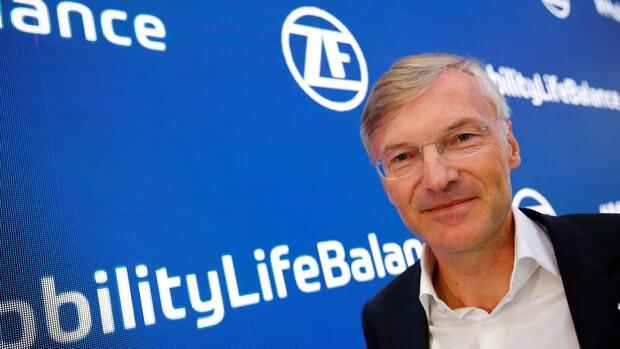ZF CEO Wolf-Henning Scheider: Germany’s large transmission specialist must switch to electromobility.
(Photo: Reuters)
Bochum The southern German automotive supplier ZF Friedrichshafen is accelerating the farewell to the combustion engine and wants to turn to electromobility more quickly. “We are in talks about the production of high-quality electrical components in our transmission plant in Saarland,” said ZF CEO Wolf-Henning Scheider on Wednesday at the CAR symposium in Bochum.
With around 9,000 employees, the factory in Saarbrücken is the largest and most important location in the entire ZF Group. The change from the internal combustion engine to the electric drive is a sometimes painful process, especially for the automotive suppliers, in which jobs are repeatedly lost.
For its largest factory in Saarland, ZF has to develop a viable future concept for the time without combustion engines. The statement by CEO Scheider is a first concrete indication that the supplier group will definitely stick to this location and will also manufacture drive components there in the long term.
Scheider did not give any further details on the future capacity utilization plans for Saarbrücken at the event in Bochum. However, he praised the work of the Saarland state government, which is intensively accompanying the structural change in the automotive industry as far as possible. Observers interpreted this as an indication that future production of electrical components at ZF in Saarbrücken could also be subsidized by state funds.
Top jobs of the day
Find the best jobs now and
be notified by email.
With more than 40,000 employees, the vehicle sector is the largest branch of industry in Saarland. Not only suppliers like ZF are coming under increasing pressure due to the transition to electromobility. The European Ford subsidiary is expected to decide at the end of the month whether its Saarlouis plant with almost 5,000 employees still has a future. In the future, electric Ford models for the European market may only be produced in Valencia, Spain, and not in Saarlouis.
>> Read about this: IG Metall fights for Saarlouis in the competition between the Ford works
At its Saarbrücken plant, ZF had primarily relied on strong business with plug-in hybrids (PHEV) and produced transmissions accordingly. But in the meantime, purely battery-electric models are increasingly in demand, and plug-in models are falling behind. BMW is one of the most important customers for ZF hybrid transmissions.
In Germany and other European countries, government funding for the PHEV is increasingly being questioned. A complete cancellation of the subsidy would probably cause demand to collapse sharply. A switch to pure electrical components, as ZF boss Scheider has now indicated, would give the company’s own location in Saarland a clearer perspective.
“The software world is changing us massively”
Scheider added that ZF strategically has change under control. However, there is still a lot to do in the operational business. By the end of the next decade, it is possible that ZF will have completely stopped manufacturing large transmissions. In the ZF Group, electric drives are already being produced in half the time of classic conventional drives.
In 2030, ZF is expected to generate more sales from electromobility products than from conventional drive technology. “The software world is changing us massively,” said Scheider at the specialist conference in Bochum.
>> Read here, how car manufacturers are restructuring their development departments in the electric age
The supplier group from Friedrichshafen on Lake Constance also wants to expand the software and IT business in the coming years. “The new gear is the chip,” emphasized the ZF boss. The supplier from southern Germany is regarded as a transmission and drive specialist; the gear wheel is a very important component in gear construction.
However, Wolf-Henning Scheider will only be involved in the further restructuring of the company for a limited time. The ZF CEO announced in March that he would not renew his contract and would leave the company at the beginning of 2023.
More: ZF boss Wolf-Henning Scheider does not extend his contract
